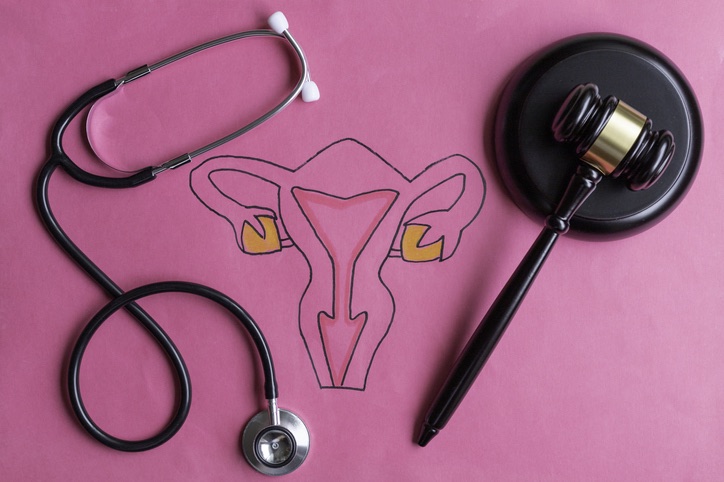Is It Still Legal to Get Abortion Pills Online in the U.S. Post-Roe Ruling?

The Supreme Court’s historic overturning of Roe v. Wade has flipped women’s reproductive rights upside-down, making abortion access across nearly half of the nation illegal. This leaves many women looking to online sources for abortion pills to end unwanted pregnancies. However, many wonder if this is still a viable solution post-Roe due to potential legal issues. Below, we detail the current information on this developing issue.
What is an Abortion?
Medication abortions and surgical abortions are two methods that healthcare professionals use to terminate a pregnancy. A medication abortion, which is also called a medical abortion, can be performed at home to end a pregnancy through 10 weeks gestation. Many women choose this method because it is a safe option, can be performed earlier in pregnancy, offers greater privacy, and is a non-invasive procedure.
According to the American College of Obstetricians and Gynecologists (ACOG), a medication abortion involves the woman taking two medications over a period of 24 to 48 hours. The combination of medications include mifepristone (Mifeprex), which stops the pregnancy from progressing any further, and misoprostol (Cytotec), which causes the uterus to contract and empty its contents. The Guttmacher Institute notes that more than half of terminated pregnancies in the nation are done through the use of medications.
During a surgical abortion, local anesthesia may be given before opening the cervix and using gentle suction or instruments to remove tissue from the uterus. Antibiotics may be prescribed after the procedure to prevent infection. Surgical abortions can be performed through 23 weeks of pregnancy, yet, fewer than 1 in 10 abortions in the U.S. occur between 13 and 20 weeks and fewer than 1 in 100 occur after 20 weeks.
How is This Different From Plan B or Birth Control Pills?

Unlike a medication abortion, Plan B is most effective 12 hours following unprotected sex or contraception failure (like a torn condom) but can be used up to 72 hours after. This form of emergency contraception uses a hormone called levonorgestrel, which essentially makes it more difficult for the sperm and the egg to meet by delaying ovulation. It also makes it harder for a fertilized egg to attach to the wall of the uterus. However, if the fertilized egg has already been implanted or you are already pregnant, the hormone will not work.
Similarly, birth control pills are hormones that are designed to prevent ovulation from occurring. As long as you take your birth control pills properly and have no underlying conditions that make them less effective, it is nearly impossible for the sperm to fertilize the egg.
Current U.S. Abortion Bans

Following the overturning of Roe v. Wade, eight states immediately banned all abortions. Thirteen other states had trigger laws in place to make this procedure illegal within thirty days or less after the ruling made on June 24, 2022. Many states have policies that restrict abortion, but others have policies to protect access to abortion care. These restrictions tie the hands of healthcare providers and may potentially make them liable for helping women seeking these services.
Does the Abortion Ban Apply to Online Abortion Pills and Medication?
Following the overturning of Roe v. Wade, many people and lawmakers questioned if the abortion bans could legally be applied to medication abortion as well. The White House has already issued a fact sheet saying the federal government will be fighting to protect access to mifepristone.
In December 2021, the Food and Drug Administration (FDA) broadened access to abortion medications, making this form of abortion care readily available by mail or at a retail pharmacy. After the Roe v. Wade ruling in June of 2022, the Biden administration continues to argue in court that the FDA’s approval of medication abortions preempts recent state restrictions, and federal authority outweighs state bans.
However, private social media platforms like Facebook and Instagram have removed advertisements from companies advertising or distributing legal abortion pills. On the same day of the ruling, both Facebook and Instagram started moderating these posts more strictly, automatically removing any material containing the phrase “abortion pills'' and other related terms. These actions could have greater consequences down the line and make it harder for women to locate reputable resources for this treatment. As of right now, it is still legal for most women to receive abortion pills online. However, the legality of this action does vary from state to state and continues to change.
Mail Order Medication Is Still Illegal in Some States
While mail order medication seems like a simple workaround for women living in stricter states, Texas lawmakers made this option illegal in the same month as the Supreme Court ruling. The punishment is jail time and a $10,000 fine to any telehealth provider who sent abortion medications by mail to Texas residents.
The laws regarding the legality of using telehealth appointments to obtain medication by mail have also been in place in other states including but not limited to Arizona, Arkansas, Louisiana, Missouri, Tennessee, West Virginia, and Oklahoma. What this means is that if you live in one of these locations, it is not legal to get abortion pills online and legal ramifications can be expected if you pursue this route. While the U.S. Postal Service will not be screening packages from these sources, it will still be extremely difficult for women in these states to find a healthcare professional to prescribe them these pills.
In What States is Ordering an Abortion Pill Online Still Legal?
Currently, Planned Parenthood’s website says that they will mail abortion pills to women living in Illinois, Pennsylvania, Maryland, Washington, D.C., Virginia, Maine, New Hampshire, Vermont, Nevada, New Mexico, Colorado, Washington, Hawaii, Minnesota, and Oregon.. While there are many other states that will do the same, in order to receive these medications they will also require a combination of some or all of the following: in-person visits with a healthcare provider, an ultrasound, counseling, and a waiting period.
International Options Are Available, But the Legality is Cloudy
There are international prescribers like Aid Access that state they will provide these medications to anyone. It will likely be hard for U.S. lawmakers to prosecute these organizations since they are located overseas, but the impact on the women receiving the pills is still murky.
Moreover, there is a big concern about the time it will take for women to receive these drugs due to their origin from pharmacies in places like India. Most importantly though, if you intend to use a healthcare provider outside of the United States, make sure that it is a reputable and safe organization.
Current Legislators Stance on This Decision
This women‘s health issue continues to develop, with the aftermath of this decision bringing regular changes in legislation. However, one thing is clear — while the Supreme Court had a majority vote to overturn Roe v. Wade, President Joe Biden and Attorney General Merrick Garland do not agree with the decision.
On June 24, 2022, the President stated:
“This fall, Roe is on the ballot. Personal freedoms are on the ballot. The right to privacy, liberty, equality, they’re all on the ballot. Until then, I will do all in my power to protect a woman’s right in states where they will face the consequences of today’s decision. While the Court’s decision casts a dark shadow over a large swath of the land, many states in this country still recognize a woman’s right to choose.
So if a woman lives in a state that restricts abortion, the Supreme Court’s decision does not prevent her from traveling from her home state to the state that allows it. It does not prevent a doctor in that state — in that state from treating her. As the Attorney General has made clear, women must remain free to travel safely to another state to seek the care they need. And my administration will defend that bedrock right.”
Thus, while not all women may not be able to have a virtual abortion legally, they do have the right to travel to other places to obtain proper treatment.
Stay Tuned for More Updates

Both the Kaiser Family Foundation (KFF), a nonprofit organization, and the Guttmacher Institute, a pro-choice research organization, are amazing resources for obtaining updates on this developing issue. They provide timely details on abortion access across the nation.
Additionally, Plan C is another nonprofit organization that can give you information on telehealth services available in your state and possible solutions if abortion is banned where you live. Finally, make sure to stay apprised by following reputable news sites to get daily reports on this evolving legislation and current state laws regarding abortion.
Over the next few months, women should expect drastic and ongoing changes to continue in the realm of reproductive health, so it is imperative that you confirm that laws and state guidelines have not changed if you decide to have a medicated abortion.

